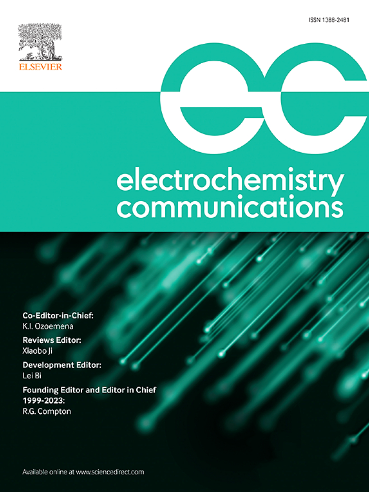Synergistic effects of magnetic fields and flow velocity on hydrogen bubble dynamics in water electrolysis
IF 4.2
3区 工程技术
Q2 ELECTROCHEMISTRY
引用次数: 0
Abstract
By systematically regulating the magnetic field intensity and electrolyte flow rate, this study investigates the coupling effects of magnetic fields and flow velocity on hydrogen bubble dynamics during water electrolysis. A model of hydrogen bubble dynamics was used to analyze nucleation, growth, and detachment mechanisms under magnetic-flow coupling, determining key parameters such as growth radius and detachment speed. The dynamic evolution of hydrogen bubbles was comprehensively analyzed under both static and dynamic flow conditions. Electrochemical measurements revealed that increasing the magnetic field intensity from 0 T to 0.3 T enhanced the current density by 9.61 % at 0 cm/s and 6.67 % at 1 cm/s flow rates. These results suggest that magnetic-flow coupling reduces concentration polarization and overpotential. However, the enhancement effect gradually diminished with increasing flow velocity. Visualization experiments further confirmed that the coupling between magnetic field and flow velocity significantly promoted bubble oscillation, coalescence, and detachment, thereby improving electrolysis performance.
磁场和流速对电解氢泡动力学的协同效应
本研究通过系统调节磁场强度和电解液流速,研究了电解过程中磁场和流速对氢气泡动力学的耦合效应。采用氢气泡动力学模型分析了磁流耦合作用下氢气泡的成核、生长和脱离机制,确定了氢气泡的生长半径和脱离速度等关键参数。综合分析了静态和动态两种流动条件下氢气气泡的动态演化过程。电化学测量表明,将磁场强度从0 T增加到0.3 T,电流密度在0 cm/s流速下提高9.61%,在1 cm/s流速下提高6.67%。这些结果表明,磁流耦合降低了浓度极化和过电位。但随着流速的增加,强化效果逐渐减弱。可视化实验进一步证实,磁场和流速的耦合作用显著促进了气泡的振荡、聚并和分离,从而提高了电解性能。
本文章由计算机程序翻译,如有差异,请以英文原文为准。
求助全文
约1分钟内获得全文
求助全文
来源期刊

Electrochemistry Communications
工程技术-电化学
CiteScore
8.50
自引率
3.70%
发文量
160
审稿时长
1.2 months
期刊介绍:
Electrochemistry Communications is an open access journal providing fast dissemination of short communications, full communications and mini reviews covering the whole field of electrochemistry which merit urgent publication. Short communications are limited to a maximum of 20,000 characters (including spaces) while full communications and mini reviews are limited to 25,000 characters (including spaces). Supplementary information is permitted for full communications and mini reviews but not for short communications. We aim to be the fastest journal in electrochemistry for these types of papers.
 求助内容:
求助内容: 应助结果提醒方式:
应助结果提醒方式:


